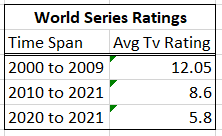In our last couple of blogs, we’ve been discussing analytics and a hot topic in baseball, the shutdown of the Shift by the MLB. The Shift itself is nothing new. The amount of data being collected and used is. As we saw in the last blog, the use of the Shift increased from 209 times in 2011 to over 50,000 times in 2021. So why now is the MLB stopping the Shift?
It turns out that what is good for winning games, is not necessarily good for MLB business. Better defense means less scoring, and less scoring leads to an arguably more boring ball game. Let’s consider the average TV ratings for the World Series. The ratings have fluctuated up and down over the years with a slight trend downward. But as we can see from the graph to the right, 2010 averages started falling significantly. In fact, the last two years of averages were at a dismal 5.8. Although it would be a reach to attribute all causation to the increase in usage of the Shift, we can definitely say that it carries some of the blame. Low ratings are bad news in the sports entertainment business.
Let’s consider the average TV ratings for the World Series. The ratings have fluctuated up and down over the years with a slight trend downward. But as we can see from the graph to the right, 2010 averages started falling significantly. In fact, the last two years of averages were at a dismal 5.8. Although it would be a reach to attribute all causation to the increase in usage of the Shift, we can definitely say that it carries some of the blame. Low ratings are bad news in the sports entertainment business.
Even though the Shift is an effective way to play defense, it is NOT the best way to sell more tickets, pull in other sports viewers, or make existing fans more excited. It is easy to understand the MLB’s decision to limit defensive boringness to increase offensive excitement to bolster business. A BI platform could easily reveal this insight providing the MLB with the necessary info needed to make a good data-driven decision.
Your business may not be deciding about the Shift, but it does have similar challenges when it comes to determining how a business process improvement may impact the overall success of the business. We can help you determine this using business intelligence.





